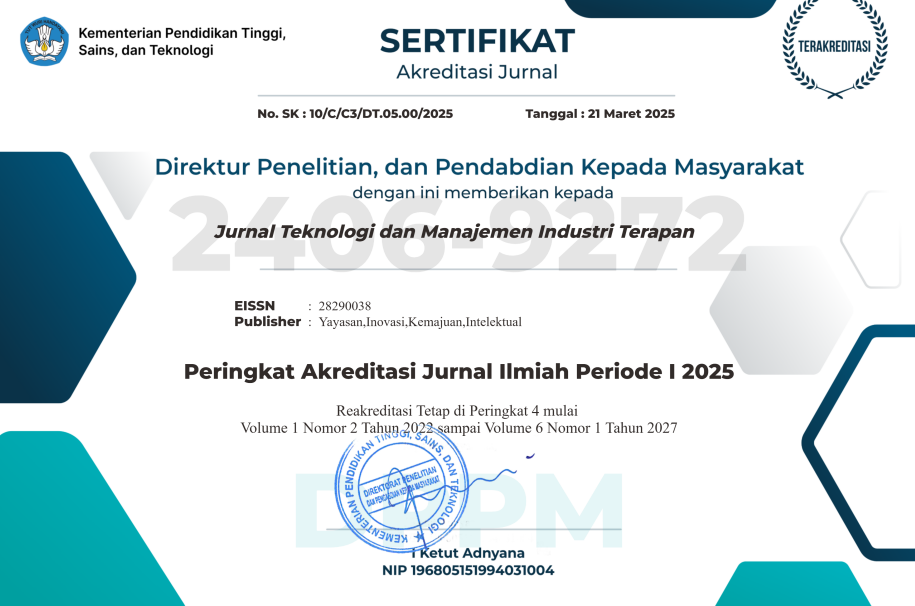Transformational Leadership and Organizational Citizenship Behavior: Moderating the Organizational Climate
DOI:
https://doi.org/10.55826/jtmit.v4i2.689Keywords:
Transformational Leadership, Organizational Citizenship Behavior, Organizational ClimateAbstract
During rapid organizational change and increasingly complex work demands, leaders are no longer just able to direct; they must be able to inspire. Transformational leadership is a leadership style that drives performance and ignites employees’ enthusiasm to go beyond the limits of their formal roles through OCB. This study aims to analyse the influence of TL on OCB behaviour and test the role of OC as a moderator variable in the relationship. This study uses a quantitative approach with the PLS-SEM method and involves 130 respondents from PT. Krakatau Tirta Industri. The data collection instrument was a Likert scale questionnaire, analyzed using SmartPLS 4 software. The results showed that TL had a positive and significant effect on OCB (β = 0.213; t = 2.131; p = 0.033), as well as OC on OCB had a positive and significant effect (β = 0.678; t = 6.920; p = 0.000). In addition, it was found that OC moderated the relationship between TL and OCB significantly (β = 0.058; t = 2.127; p = 0.030), suggesting that in supportive OC, the influence of TL on OCB became stronger. Likewise, the R² value of 80.3% provides evidence that TL and OC, along with their interactions, are strong and relevant predictors of OCB levels. The theoretical implications of these findings underscore the importance of integrating contextual organisational factors in the study of leadership effectiveness and encouraging organisations to create an empowering work environment to optimise employee voluntary contributions. These findings also enrich the literature on organisational behaviour by demonstrating how leadership dimensions and work climate interact to shape positive behaviour in the workplace.
References
C. J. C.deGeus, A.Ingrams, L.Tummers, andS. K.Pandey, “Organizational Citizenship Behavior in the Public Sector: A Systematic Literature Review and Future Research Agenda,” Public Adm. Rev., vol. 80, no. 2, pp. 259–270, Mar.2020, doi: 10.1111/puar.13141.
S.Nurjanah, V.Pebianti, andA. W.Handaru, “The influence of transformational leadership, job satisfaction, and organizational commitments on Organizational Citizenship Behavior (OCB) in the inspectorate general of the Ministry of Education and Culture,” Cogent Bus. Manag., vol. 7, no. 1, p. 1793521, Jan.2020, doi: 10.1080/23311975.2020.1793521.
K. R.Novianti, “Does organizational commitment matter? Linking transformational leadership with organizational citizenship behavior (OCB),” J. Apl. Manaj., vol. 19, no. 2, pp. 335–345, Jun.2021, doi: 10.21776/ub.jam.2021.019.02.09.
M. C. C.Lee, M.-H.Lin, P. M.Srinivasan, andS. C.Carr, “Transformational leadership and organizational citizenship behavior: new mediating roles for trustworthiness and trust in team leaders,” Curr. Psychol., Aug.2023, doi: 10.1007/s12144-023-05095-x.
Y. B.Hermanto, V. A.Srimulyani, andD. J. Pitoyo, “The mediating role of quality of work life and organisational commitment in the link between transformational leadership and organisational citizenship behaviour,” Heliyon, vol. 10, no. 6, p. e27664, Mar.2024, doi: 10.1016/j.heliyon.2024.e27664.
M. A. West and C. A. Sacramento, “Creativity and innovation: The role of team and organisational climate,” in Handbook of Organisational Creativity, Elsevier, 2023, pp. 317–337. doi: 10.1016/B978-0-323-91840-4.00024-4.
H.Pradoto, S.Haryono, andS. H. Wahyuningsih, “The role of work stress, organisational climate, and improving employee performance in the implementation of work from home,” Work, vol. 71, no. 2, pp. 345–355, Feb.2022, doi: 10.3233/WOR-210678.
B.Van denBulcke et al., “Ethical climate and intention to leave among critical care clinicians: an observational study in 68 intensive care units across Europe and the United States,” Intensive Care Med., vol. 46, no. 1, pp. 46–56, Jan.2020, doi: 10.1007/s00134-019-05829-1.
M. R. Parke and M.-G.Seo, “The Role of Affect Climate in Organisational Effectiveness,” Acad. Manag. Rev.., vol. 42, no. 2, pp. 334–360, Apr.2017, doi: 10.5465/amr.2014.0424.
P. E. Geue, “Positive Practices in the Workplace: Impact on Team Climate, Work Engagement, and Task Performance,” J. Appl. Behav. Sci., vol. 54, no. 3, pp. 272–301, Sep.2018, doi: 10.1177/0021886318773459.
L. Xintian and P.Peng, “Does inclusive leadership foster employee psychological resilience? The role of perceived insider status and supportive organizational climate,” Front. Psychol., vol. 14, pp. 01–12, Mar.2023, doi: 10.3389/fpsyg.2023.1127780.
G.Martinolli, A.Sanín Posada, andN.Tordera, “The ECO VI Organisational Climate Scale: An Invariance Study in Four Latin American Countries,” Int. J. Psychol. Res., vol. 16, no. 1, pp. 89–102, May 2023, doi: 10.21500/20112084.5937.
E. M. Azila-Gbettor, B. Q. Honyenuga, E. A. Atatsi, C. N. Ayertso Laryea, and A. N. Konadu Quarshie, “Reviewing the influence of positive leadership on worker well-being: A comprehensive analysis,” Heliyon, vol. 10, no. 2, p. e24134, Jan.2024, doi: 10.1016/j.heliyon.2024.e24134.
B. Afsar, M.Masood, and W. A. Umrani, “The role of job crafting and knowledge sharing on the effect of transformational leadership on innovative work behaviour,” Pers. Rev.., vol. 48, no. 5, pp. 1186–1208, Aug.2019, doi: 10.1108/PR-04-2018-0133.
S. A.Qalati, Z.Zafar, M.Fan, M. L.Sánchez Limón, andM. B.Khaskheli, “Employee performance under transformational leadership and organisational citizenship behaviour: A mediated model,” Heliyon, vol. 8, no. 11, p. e11374, Nov.2022, doi: 10.1016/j.heliyon.2022.e11374.
S. M. Aldhaheri and S. Z.Ahmad, “The influence of transformational leadership on organizational performance and knowledge management capability,” Int. J. Product. Perform. Manag., vol. 73, no. 9, pp. 2830–2857, Nov.2024, doi: 10.1108/IJPPM-10-2022-0532.
S. K.Hilton, W.Madilo, F.Awaah, andH.Arkorful, “Dimensions of transformational leadership and organizational performance: the mediating effect of job satisfaction,” Manag. Res. Rev.., vol. 46, no. 1, pp. 1–19, Jan.2023, doi: 10.1108/MRR-02-2021-0152.
J.Saranya and A.Anbu, “The Impact of Transformational Leadership on Organizational Citizenship Behavior for the Environment in Manufacturing Industry,” Qubahan Acad. J., vol. 5, no. 1, pp. 388–404, Mar.2025, doi: 10.48161/qaj.v5n1a1272.
S. Park and E.Kim, “Employees’ citizenship behaviour and workplace climate in promoting knowledge sharing,” Knowl. Process Manag., vol. 28, no. 4, pp. 345–352, Oct.2021, doi: 10.1002/kpm.1686.
J. Hair, T.Hult, C.Ringle, and M. Sarstedt, A primer on partial least squares structural equation modelling (PLS-SEM), vol. 38, no. 2. Los Angeles: SAGE, 2017. doi: 10.1080/1743727x.2015.1005806.
H.Zhang, Z.Liu, and Y.Wang, “How transformational leadership positively impacts organisational citizenship behaviour in successful Chinese social work service organisations,” Nonprofit Manag. Leadership, vol. 30, no. 3, pp. 467–485, Mar.2020, doi: 10.1002/nml.21391.
W. S. Prabowo, “Organizational Citizenship Behavior, Organizational Climate, and Employee Performance,” J. Econ. Bus., vol. 3, no. 4, pp. 1500–1506, Dec.2020, doi: 10.31014/aior.1992.03.04.297.
N.Siangchokyoo, R. L.Klinger, andE. D.Campion, “Follower transformation as the linchpin of transformational leadership theory: A systematic review and future research agenda,” Leadersh. Q., vol. 31, no. 1, p. 101341, Feb.2020, doi: 10.1016/j.leaqua.2019.101341.
G.Saad Alessa, “The Dimensions of Transformational Leadership and Its Organisational Effects in Public Universities in Saudi Arabia: A Systematic Review,” Front. Psychol., vol. 12, Nov.2021, doi: 10.3389/fpsyg.2021.682092.
K. Breevaart and A. B.Bakker, “Daily job demands and employee work engagement: The role of daily transformational leadership behaviour.,” J. Occup. Health Psychol., vol. 23, no. 3, pp. 338–349, Jul.2018, doi: 10.1037/ocp0000082.
Y. H.Lee, B.Woo, and Y.Kim, “Transformational leadership and organisational citizenship behaviour: Mediating role of affective commitment,” Int. J. Sports Sci. Coach, vol. 13, no. 3, pp. 373–382, Jun.2018, doi: 10.1177/1747954117725286.
G. Randhawa and K.Kaur, “An Empirical Assessment of Impact of Organizational Climate on Organizational Citizenship Behaviour,” Paradig. A Manag. Res. J., vol. 19, no. 1, pp. 65–78, Jun.2015, doi: 10.1177/0971890715585202.
C.-C.Teng, A. C. C.Lu, Z.-Y.Huang, and C.-H.Fang, “Ethical work climate, organisational identification, leader-member-exchange (LMX) and organisational citizenship behaviour (OCB),” Int. J. Contemp. Hosp. Manag., vol. 32, no. 1, pp. 212–229, Jan.2020, doi: 10.1108/IJCHM-07-2018-0563.
N.Annisa, A. W.Handaru, andD.Dara, “Pengaruh Iklim Organisasi dan Komitmen Organisasi Terhadap Organizational Citizenship Behavior (OCB) Pada Karyawan PT A,” Innov. J. Soc. Sci. Res., vol. 4, no. 4, pp. 4966–4982, 2024, doi: 10.31004/innovative.v4i4.13089.
N. N. Sofwati, Meiske Claudia, and Aprianti, “The Effect of Organisational Climate on Organisational Citizenship Behaviour (OCB) Through Work Engagement as an Intervening Variable: A Case Study of Employees of the Regional Office of the Directorate General of Treasury of South Kalimantan Province,” Open Access Indones. J. Soc. Sci., vol. 6, no. 6, pp. 1198–1205, Aug.2023, doi: 10.37275/oaijss.v6i6.191.
A.Khalili, “Linking transformational leadership, creativity, innovation, and innovation-supportive climate,” Manag. Decis., vol. 54, no. 9, pp. 2277–2293, Oct.2016, doi: 10.1108/MD-03-2016-0196.
B.Bass, “Transformational leadership theory,” in Organisational Behaviour 1, Routledge, 2015, pp. 361–385.
Downloads
Published
Issue
Section
License
Copyright (c) 2025 Dian Wirtadipura, Wahyudi Wahyudi

This work is licensed under a Creative Commons Attribution-NonCommercial-ShareAlike 4.0 International License.


















